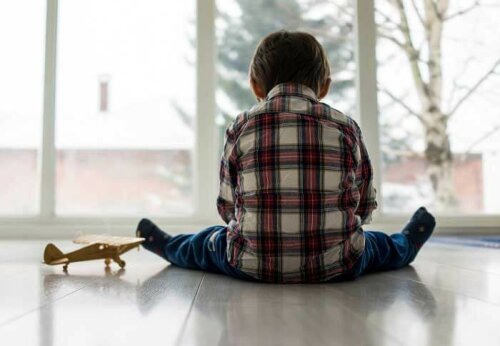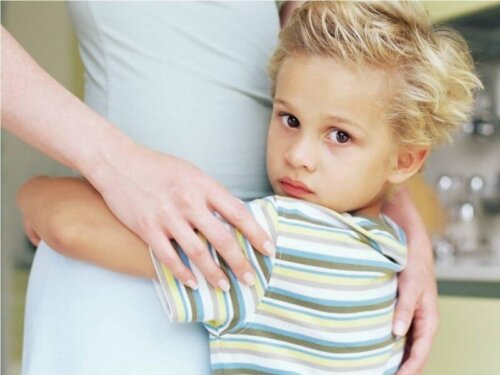Emotionally Unavailable Parents: What Are They Like?


Written and verified by the psychologist Valeria Sabater
Emotionally unavailable parents mark a child’s development. Neglect isn’t easy for a child’s mind to process. After all, they don’t understand why their parents don’t respond to their needs. So much so that the feeling of guilt is usually experienced with a feeling of loneliness and helplessness.
Believe it or not, many adults turn to a psychologist because they have a lot of discomforts but they have no idea why. They talk about feeling empty, as well as their inability to build stable and happy relationships. They also comment on how difficult it is for them to manage their emotions, anger, and frustration, among other emotions.
Once the psychologist delves a bit deeper into the patient’s reality, they can tell their trauma isn’t obvious, and neither is any diagnosable disorder or psychological condition. So what’s going on, then? Basically, there’s an emotional void, the mark of an emotional abandonment originated by parents who didn’t attend (or didn’t know how to attend to) their children’s needs during their early years of life.
This dimension is overlooked often in the field of psychology. In some ways, we focus more on harsh events as physical or emotional abuse. However, something as basic as parents who aren’t emotionally accessible can create deep wounds as well.
Emotionally unavailable parents and cold parenting
Some parents, although present, are absent. There are cold mothers and indifferent fathers. Basically, some families are negligent in matters of emotions, in the ability to build safe and healthy attachments with their children. All these dynamics define small universes capable of marking a person’s life.
Furthermore, Alice Miller, a renowned psychoanalyst and child abuse expert, said something worth reflecting on. According to her, no one knows what the world would be like if all children were lucky enough to grow up in a family environment based on affection and deep appreciation. A world where humiliation and neglect didn’t exist.
Clearly, it’d be a much better world, one where everyone respected each other. But there’s a harsh truth: that not everyone makes it out okay from negligent parenting. Sometimes, physical abuse doesn’t need to occur for the suffering to impact the child; words can hurt just as much, as well as indifference. Factors such as abandonment, an authoritarian upbringing, or emotionally unavailable parents affect a child’s psychological development.
But what are emotionally unavailable parents really like? Below, we’ll mention the basic characteristics that define them.

Emotional instability
A very common trait in this type of parent is emotional instability. In many cases, more than coldness or rejection, what the child faces is uncertainty. Sometimes, these fathers and mothers are affectionate and cordial, and then all of a sudden, their mood changes and they may reject their children.
Something like this causes a child great suffering and anxiety.
Low tolerance to stress
This profile, characterized by emotional inaccessibility, is also defined by low tolerance to stress. It implies that any task with their children is absolutely exhausting. Investing time, effort, and attention in raising their children is a sacrifice that they aren’t always willing to make. They lack patience. For that reason, they tend to seek strategies to ensure that their children nag them as little as possible.
Poor boundaries
Emotionally unavailable parents often act more like acquaintances or friends. They don’t know how to educate their children, so they don’t set clear boundaries, they show them little to no support, and they don’t act as role models. As a result, the child doesn’t know what to expect, neither from themselves nor those around them.
Narcissistic personality
Constant selfishness, not seeing other people’s needs but their own, superficiality, falsehood, making false promises, and projecting their own frustration or apathy on their children… Without a doubt, all these behaviors define a narcissistic personality that ravages children’s psychological development.

The impact of emotionally neglectful parents
The consequences of growing up with emotionally unavailable parents are often diverse. It’s common to have a hard time building happy affective relationships, since the individual’s self-esteem is probably very damaged. Additionally, they often have issues with identity and emotional management. These people don’t seem to have a clear purpose in life.
The most striking thing is that many of these adults can’t seem to trust others. More often than not, they’re too afraid to get a sense of security with those around them in fear they’ll eventually be rejected or neglected. Many fear they won’t ever be able to make a happy life for themselves.

Now, we must mention that not all people live this reality in the same way. Some have a more resilient approach and are able to rebuild their lives. You need to remember that what you experienced in childhood doesn’t have to determine the quality of your present. You can and must rebuild yourself.
Validating your individuality, attending to your needs, placing new projects on the horizon, and clarifying your purpose can be of great help. You can also seek professional help to overcome these harsh realities with better resources and approaches.
Emotionally unavailable parents mark a child’s development. Neglect isn’t easy for a child’s mind to process. After all, they don’t understand why their parents don’t respond to their needs. So much so that the feeling of guilt is usually experienced with a feeling of loneliness and helplessness.
Believe it or not, many adults turn to a psychologist because they have a lot of discomforts but they have no idea why. They talk about feeling empty, as well as their inability to build stable and happy relationships. They also comment on how difficult it is for them to manage their emotions, anger, and frustration, among other emotions.
Once the psychologist delves a bit deeper into the patient’s reality, they can tell their trauma isn’t obvious, and neither is any diagnosable disorder or psychological condition. So what’s going on, then? Basically, there’s an emotional void, the mark of an emotional abandonment originated by parents who didn’t attend (or didn’t know how to attend to) their children’s needs during their early years of life.
This dimension is overlooked often in the field of psychology. In some ways, we focus more on harsh events as physical or emotional abuse. However, something as basic as parents who aren’t emotionally accessible can create deep wounds as well.
Emotionally unavailable parents and cold parenting
Some parents, although present, are absent. There are cold mothers and indifferent fathers. Basically, some families are negligent in matters of emotions, in the ability to build safe and healthy attachments with their children. All these dynamics define small universes capable of marking a person’s life.
Furthermore, Alice Miller, a renowned psychoanalyst and child abuse expert, said something worth reflecting on. According to her, no one knows what the world would be like if all children were lucky enough to grow up in a family environment based on affection and deep appreciation. A world where humiliation and neglect didn’t exist.
Clearly, it’d be a much better world, one where everyone respected each other. But there’s a harsh truth: that not everyone makes it out okay from negligent parenting. Sometimes, physical abuse doesn’t need to occur for the suffering to impact the child; words can hurt just as much, as well as indifference. Factors such as abandonment, an authoritarian upbringing, or emotionally unavailable parents affect a child’s psychological development.
But what are emotionally unavailable parents really like? Below, we’ll mention the basic characteristics that define them.

Emotional instability
A very common trait in this type of parent is emotional instability. In many cases, more than coldness or rejection, what the child faces is uncertainty. Sometimes, these fathers and mothers are affectionate and cordial, and then all of a sudden, their mood changes and they may reject their children.
Something like this causes a child great suffering and anxiety.
Low tolerance to stress
This profile, characterized by emotional inaccessibility, is also defined by low tolerance to stress. It implies that any task with their children is absolutely exhausting. Investing time, effort, and attention in raising their children is a sacrifice that they aren’t always willing to make. They lack patience. For that reason, they tend to seek strategies to ensure that their children nag them as little as possible.
Poor boundaries
Emotionally unavailable parents often act more like acquaintances or friends. They don’t know how to educate their children, so they don’t set clear boundaries, they show them little to no support, and they don’t act as role models. As a result, the child doesn’t know what to expect, neither from themselves nor those around them.
Narcissistic personality
Constant selfishness, not seeing other people’s needs but their own, superficiality, falsehood, making false promises, and projecting their own frustration or apathy on their children… Without a doubt, all these behaviors define a narcissistic personality that ravages children’s psychological development.

The impact of emotionally neglectful parents
The consequences of growing up with emotionally unavailable parents are often diverse. It’s common to have a hard time building happy affective relationships, since the individual’s self-esteem is probably very damaged. Additionally, they often have issues with identity and emotional management. These people don’t seem to have a clear purpose in life.
The most striking thing is that many of these adults can’t seem to trust others. More often than not, they’re too afraid to get a sense of security with those around them in fear they’ll eventually be rejected or neglected. Many fear they won’t ever be able to make a happy life for themselves.

Now, we must mention that not all people live this reality in the same way. Some have a more resilient approach and are able to rebuild their lives. You need to remember that what you experienced in childhood doesn’t have to determine the quality of your present. You can and must rebuild yourself.
Validating your individuality, attending to your needs, placing new projects on the horizon, and clarifying your purpose can be of great help. You can also seek professional help to overcome these harsh realities with better resources and approaches.
All cited sources were thoroughly reviewed by our team to ensure their quality, reliability, currency, and validity. The bibliography of this article was considered reliable and of academic or scientific accuracy.
- Krause, E. D., Mendelson, T., & Lynch, T. R. (2003). Childhood emotional invalidation and adult psychological distress: The mediating role of emotional inhibition. Child Abuse and Neglect, 27(2), 199–213. https://doi.org/10.1016/S0145-2134(02)00536-7
- Frodl, T., Reinhold, E., Koutsouleris, N., Reiser, M., & Meisenzahl, E. M. (2010). Interaction of childhood stress with hippocampus and prefrontal cortex volume reduction in major depression. Journal of Psychiatric Research, 44(13), 799–807. https://doi.org/10.1016/j.jpsychires.2010.01.006
This text is provided for informational purposes only and does not replace consultation with a professional. If in doubt, consult your specialist.







